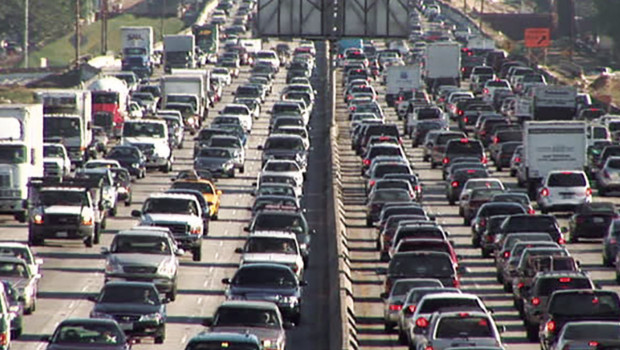by McKay Jenkins
The U.S. interstate highway system was designed to keep America safe in case of invasion, but it had dramatic consequences for the way we live today.
A friend of mine recently said that he found it easier to imagine the end of the world than to imagine the end of capitalism.
I thought about this idea a great deal as I was doing research for my book Food Fight: GMOs and the  Future of the American Diet. The deeper I looked, the more it became clear that many of the serious environmental problems the world currently faces—climate change, soil depletion, chemical pollution, species loss—are intractable not because of a failure of human intelligence but because of a failure of human imagination.
Future of the American Diet. The deeper I looked, the more it became clear that many of the serious environmental problems the world currently faces—climate change, soil depletion, chemical pollution, species loss—are intractable not because of a failure of human intelligence but because of a failure of human imagination.
Or perhaps, more precisely, a failure of memory.
Remember: Our current precipitous ecological decline only began accelerating about 75 years ago, a change driven by World War II. As much as the war tore holes in the heart of Europe and Asia, it also, in its aftermath, hit the rest of the world like a meteor. In the years after the war, the United States decided that the best way to defend itself against future invasion was to build a monumental interstate highway system. This network of wide, highly engineered superhighways—modeled after the German Autobahn and named for President Dwight Eisenhower—would allow the free deployment of armored vehicles from Maine to Florida, from Washington to San Diego, and everywhere in between.
So far so good. The U.S. has not recently been invaded by land. But in a dramatic example of unintended consequences, the interstate highway system, designed to keep the U.S. safe, has been a root cause of dramatic global political and environmental instability. The interstates—all 47,000 miles of them—have not just been used for troop transport, of course. As larger and larger roadways were constructed, they not only connected major cities but led to an endless series of concentric ring roads around cities. This allowed more and more Americans to move out into the seemingly infinite number of housing developments built in the suburbs.
Again, so far so good. This was the American Dream: the big house in the suburbs; the two-car garage; the home full of flat-screen televisions; the whole bit. And the cost?
Most obviously, all these roads, and all these cars, made the U.S. a country of commuters, utterly dependent on fossil fuels to drive their vehicles, and to heat and cool their big houses. But fossil fuels were also turned into everything from cosmetics and wall-to-wall carpeting to baby pajamas and plastic water bottles—all the innumerable consumer products we now can’t imagine giving up.
It has become a cliché to remark that Americans make up less than 5 percent of the world’s population yet consume 25 percent of the world’s energy. This is where that number was born. The myriad problems associated with our dependence on fossil fuels (warfare in oil-producing countries; climate change; rising sea levels, ocean acidification, species loss) can all, in large measure, be traced to the explosion of growth that sprouted along the American interstate highway system.
There’s more. All those suburban roadways and housing developments also gave rise to a colossal shift in land use known as the Great American Lawn. There are now some 63,000 square miles of turf grass in the U.S., and lawn care has become something of a national obsession.
So far so good. But lawns require the cutting of forests, the removal of native plants, and for many people extensive use of lawn chemicals.
So the question remains: Is it possible to imagine, or to remember, a time when we didn’t need all of this? All of these lawn chemicals and plastic bottles and monoculture food crops that do little more than make corn chips and fast food burgers?
McKay Jenkins is a professor of English, journalism and environmental humanities at the University of Delaware. He is the author of seven books, including ContamiNation and Poison Spring. A former staff writer for the Atlanta Constitution, he has also written for Outside, Orion, and The New Republic. He will be speaking at The Real Truth About Health Conference, which will be held Feb. 2-11, 2018, at the Long Island Hilton, in Melville (RealTruthTalks.com).





